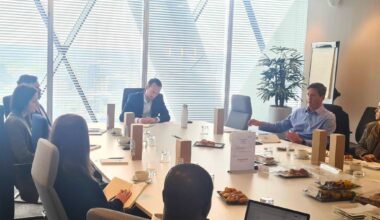The global COVID-19 crisis has disrupted nearly every facet of the economy. Organizations across industries and geographies face increasingly insurmountable business challenges, and mass layoffs and furloughs remain the headlines of the day. We’ve witnessed these impacts on the IR function, but wanted to look at how the investor relations career market has changed as a result of the current climate.
We sat down with seasoned investor relations search consultant, Peter McDermott to discuss the state of the IR recruiting and the impact the global pandemic has had on the IR field. Peter is Senior Client Partner in the Corporate Affairs and Investor Relations Center of Expertise for Korn Ferry.
COVID’s impact on IR recruiting
“Frankly, had you asked me a month ago about the impact of COVID-19, I would have had some real concerns around business, searches and new hiring efforts, but several weeks in, it’s become clear that clients are still hiring in this new environment,” Peter shares.
Peter reports that, even as some elements of the economy have all but ceased, IR hiring is plugging along and adapting relatively well. He attributes this to the importance of the IR function, especially in times of economic turmoil. Peter sees the IRO role as indispensible with every organization’s financial messaging under increased scrutiny now.
While encouraged by this continued focus on and enthusiasm for filling these critical positions, Peter cautions that this certainly isn’t “business as usual.” Immediately following the outbreak, his team worked to quickly manage expectations and establish adapted processes for clients around the world, introducing updated practices that take current realities into account, such as the creation of a guide for clients around video conference interview best practices.
As the recruiting process adapts, one emerging pattern resulting from the transition to video interviews is the reluctance of some candidates to join an organization without meeting the team in person. Peter says that while we tend to talk about culture fit on the hiring side, this is a clear reminder that it’s equally important from the candidate’s perspective.
“Alongside buying or selling a home, changing careers is one of the biggest investments people make in their lives,” says Peter. “It’s not surprising that candidates are hesitant to leave a stable situation, especially where they’ve built a strong level of trust and know that they’ll be valued and supported through good times and bad. Personal loyalty is also a factor, deterring these professionals from leaving their current leadership high and dry without the right person in place to help them navigate these uncertain times.”
Perhaps a bit counterintuitive with layoffs and furloughs taking center stage in so many other industries, Peter believes that now is a time when IROs should look for opportunities to flex their muscles and show their strength and value.
State of the IR search market beyond COVID-19
Even before the onset of COVID-19, a number of factors had begun to influence the IR labor market.
“Historically, IR grew out of PR and communications but in the last 10-15 years has evolved into more of a strategic financial role, said Peter. “Today, IR has a well-deserved and earned seat at the table, and because of the financial acumen required to be successful in the role, as well as regulatory factors impacting analyst compensation, we’ve seen the continued emergence of analysts candidates seeking senior IR roles.”
That being said, IR leaders who don’t have that experience can round out their skill set with CFA, IRC, MBA or further professional development. Peter and his team absolutely recognize the value derived from spending years in the IR seat, especially seasoned experience providing executive team counsel.
“Nothing will ever replace years of experience in the seat,” he explains. “Which is why we haven’t seen a full emergence of the analyst community taking these IRO roles.”
IR recruiting has also seen increased attention on succession planning, with leadership teams proactively outlining future plans for IROs. Peter reports several recent assignments where the CFO has been specific about looking for a candidate to manage IR immediately, eventually take on another finance role and then ultimately transition to the CFO position. This path shifts focus toward financial acumen, modeling skills and the candidate’s ability to be flexible and adaptable across the leadership team.
Peter also highlights a recent pattern emerging around closing the gender pay gap within the IR market. In partnership with NIRI, Korn Ferry recently released research examining compensation, gender, and the continued evolution of the industry’s leaders. The latest data generated by this ongoing study illustrated an encouraging shift with the average gender pay gap now less than 5%.
What the c-suite is looking for in an IR pro
“One of the things I enjoy about working in the IR industry is the diversity of backgrounds,” Peter shares. “No one ever graduated planning for a career in investor relations. Nearly everyone fell into it, fell in love with it and evolved their career accordingly.”
While many candidate requirements are driven by the specific needs of an organization and its industry, best-in-class IROs share a number of similarities. These professionals often have related components in their background, including time at IR agencies or consultancies, earlier experience on the street, a stretch in marketing or communications departments, and more recently, sell side and buy side experience.
Peter shares that most hiring managers start with the basics, seeking IRO candidates with financial acumen, financial modeling expertise and the ability to translate complicated subject matter into something easily digested by various stakeholders. Of course communication and messaging skills are critical, including experience adapting to internal style and messaging, given the need for IROs to manage up, down and across.
Beyond the fundamentals, Peter highlights diversity of experience and industry adaptability as two specific qualifications that rise to the top for hiring managers. He notes that best-in-class IROs aren’t content when they’re bored, and tend to seek new challenges when opportunities are not being offered internally. Many top tier IR leaders have purposely diversified their experience to broaden their skill set and show their agility.
Of course, EQ and culture fit are also critically important considerations, and the reason that Korn Ferry takes painstaking care in understanding the management team needs and personalities to help determine what level of EQ is necessary for the candidate to be successful in his or her role. Peter and his team use a combination of qualitative interviews, proprietary assessment tools and partner with organizational psychologists on every assignment to ensure a strong cultural fit, increased success rates, and longer tenure once hired
On top of everything else, it often comes down to simply measuring career experience. If someone has been steering a steady ship for 20 years, facing minimal challenges, this might not be an attractive candidate for a hiring manager in search of someone to manage a more volatile industry or navigate the uncertainty of a moment like the one we’re all living through right now.
Tips for candidates
Acknowledging that now is a unique time in the IR labor market, Peter shared some of his best tips for IRO entering the career market.
- Don’t assume your resume and career speak for themselves. Walk into interviews prepared to market your skills, experience and value.
- Do your homework! High profile management teams expect that you’ve done your homework prior to walking in to the interview. Show your interest by spending time getting to know the company on a higher level – dig into the companies financials, get to know their leadership team, ESG position, industry, peers, competitors etc.
- Listen first. Candidates need to build relationships with internal stakeholders and that starts with the interview. Don’t come on too strong and take complete control of the interview.
- Prepare to add value. Once you’ve listened and made an effort to understand the management team and its challenges, think about and be ready to share ways you might improve, elevate or evolve their IR platform.
- Check THEIR references. Companies will most certainly check references of the candidate so there’s no reason candidates shouldn’t feel empowered to do the same to ensure a culture fit. Best in class IR talent are motivated to a challenge, but they want to know what they are walking into to best position the IR function for success. Where you have solid relationships with analysts and IR consultants with knowledge, reach out to get their perspectives on the company and its leadership.
- Be proactive about what you’re looking for professionally. No one will fault you for being honest about your career intentions and management teams often respond really well by building roles and responsibilities around the professional rather than trying to shove them in a box.
- And finally, for some advice related to the current environment, don’t try to compare this to past crises and downturns. Rather than providing examples of how you navigated past situations, highlight your agility more generally as well as your ability to adapt to any environment. This isn’t like any other situation we’ve experienced, so it’s better to position your candidacy for the future – whatever that is.
For more career advice and best practices from veteran IRO’s see our recent blog post, where seasoned professionals from around the industry share tips and discuss what they wish they’d known when starting in IR.


